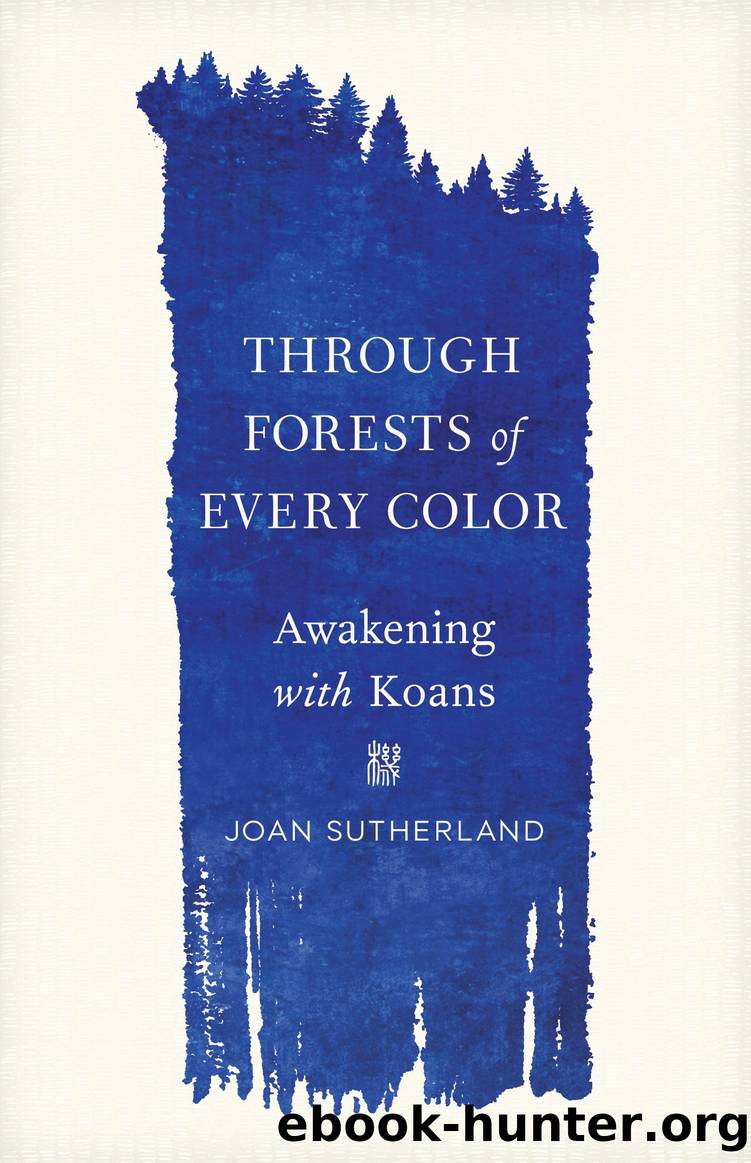Through Forests of Every Color by Joan Sutherland

Author:Joan Sutherland [Sutherland, Joan]
Language: eng
Format: epub
Publisher: Shambhala
Published: 2022-06-21T00:00:00+00:00
13
The Question of Answers
The bright road that the ancestors knew is right in front of you, in everything you see and hear.
YUANWU
Traditionally each koan has had a specific answer, teachers have had manuals of the answers accepted by their school, and students were sent back to their cushions with their koan as many times as it took to realize those traditional answers. Often there wasnât much other conversation during interviews. The teacherâs notes I received contained answers for some koans going back four lineage generations and occasionally further than that. It was moving to come to know the distinctive voices of my recent ancestors, and I considered this text one of the most precious gifts I passed on to the people I asked to be teachers.
Many people continue to practice this way. But it was becoming clear to some of us that these answers could no longer automatically be the last word, as the koans say. Students were bringing in responses that included but were not limited to the traditional answers. Often the traditional point wasnât the only powerful thing, or even the most powerful thing, about the koan for them. As people were more interested in taking the koans deeply into their lives than in working through a curriculum, it was clear that the traditional answers illuminated an essential but not unlimited portion of the koan field.
For example, one of the Miscellaneous Koans is âSave a ghost.â The traditional answer is an elaboration on âBoo!â in the sense of becoming the ghost yourself. As it was explained to me, you save the ghost by including it. I was even shown the particular Japanese ghosts that my ancestors had presented. Then students spontaneously began bringing in their own ghosts, the unacknowledged and disinherited parts of themselves by which they were haunted. Suddenly things got big. The principle is the sameâyou save something by welcoming it home from exileâbut itâs a different experience when what youâre saving isnât a generic idea of âghostâ but your own particular, painful fragments of psyche. The question of who was saving whom in these reunions was inevitable when the ghosts came so close. Then people began to acknowledge our collective ghosts, those our societies harm by marginalizing them.
When âSave a ghostâ came up in a private koan seminar with some of the elders of my lineage, a couple of us younger teachers presented these newer responses. They were dismissed out of hand as being too personal. The other younger teacher and I glanced at each other, and it was immediately clear that neither of us could imagine returning to âBoo!â as the hoped-for response to this koan.
With some koans, particularly those involving women, the traditional answers were limited by bias. I remember one koan in particular whose answer hinged on whether you thought a man had bested a woman in a sort of dharma contest. The received answer picked a winner, but I thought the koan itself didnât; it seemed to be describing a meeting of equals.
Download
This site does not store any files on its server. We only index and link to content provided by other sites. Please contact the content providers to delete copyright contents if any and email us, we'll remove relevant links or contents immediately.
Kathy Andrews Collection by Kathy Andrews(10521)
The remains of the day by Kazuo Ishiguro(7552)
Spare by Prince Harry The Duke of Sussex(4199)
Paper Towns by Green John(4169)
The Body: A Guide for Occupants by Bill Bryson(3802)
Be in a Treehouse by Pete Nelson(3214)
Harry Potter and the Goblet Of Fire by J.K. Rowling(3046)
Goodbye Paradise(2964)
Never by Ken Follett(2884)
Into Thin Air by Jon Krakauer(2703)
The Remains of the Day by Kazuo Ishiguro(2620)
The Genius of Japanese Carpentry by Azby Brown(2609)
The Cellar by Natasha Preston(2595)
Drawing Shortcuts: Developing Quick Drawing Skills Using Today's Technology by Leggitt Jim(2532)
120 Days of Sodom by Marquis de Sade(2439)
Architecture 101 by Nicole Bridge(2351)
The Man Who Died Twice by Richard Osman(2300)
Machine Learning at Scale with H2O by Gregory Keys | David Whiting(2293)
Fairy Tale by Stephen King(2072)
